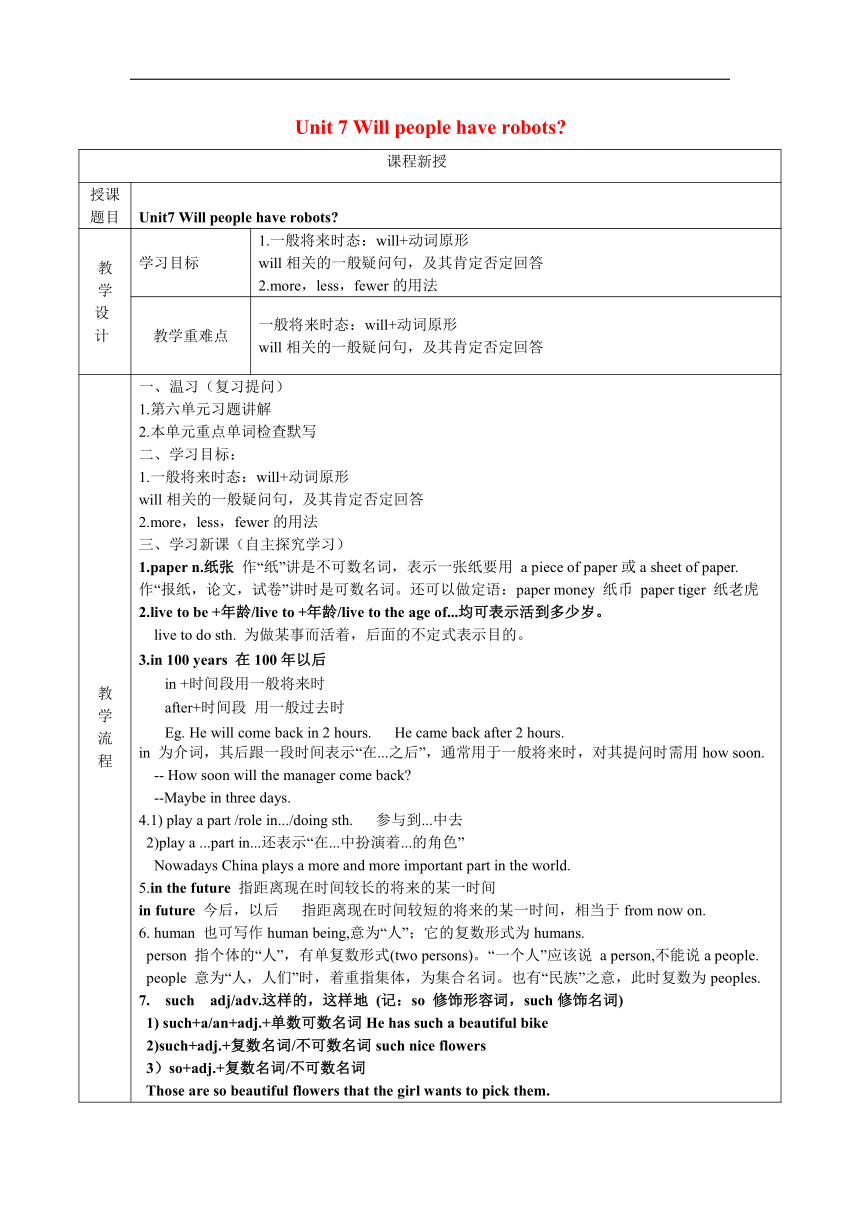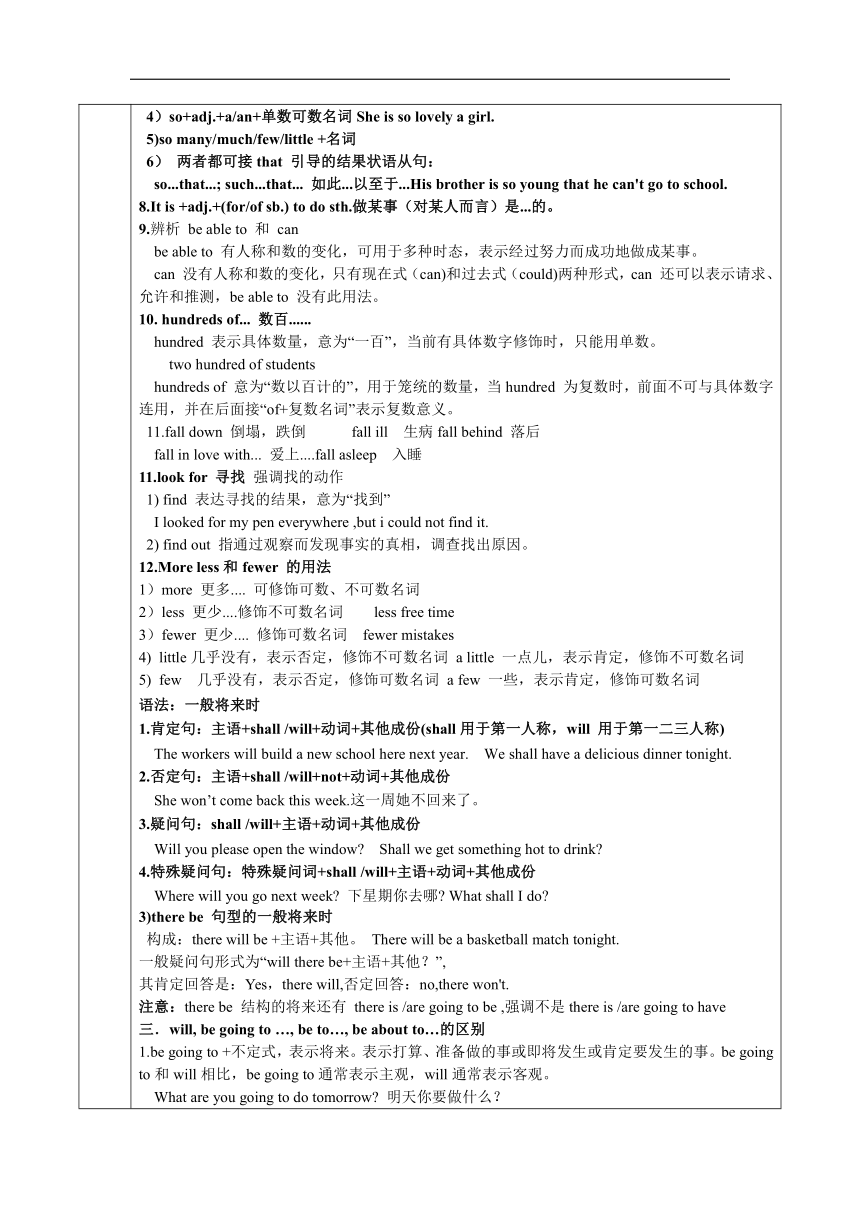Unit 7 Will people have robots.单元知识讲义及同步练习(无答案)
文档属性
| 名称 | Unit 7 Will people have robots.单元知识讲义及同步练习(无答案) |

|
|
| 格式 | zip | ||
| 文件大小 | 14.3KB | ||
| 资源类型 | 教案 | ||
| 版本资源 | 人教新目标(Go for it)版 | ||
| 科目 | 英语 | ||
| 更新时间 | 2018-09-10 00:00:00 | ||
图片预览


文档简介
Unit 7 Will people have robots?
课程新授
授课题目
Unit7 Will people have robots?
教
学
设
计
学习目标
一般将来时态:will+动词原形
will相关的一般疑问句,及其肯定否定回答
2.more,less,fewer的用法
教学重难点
一般将来时态:will+动词原形
will相关的一般疑问句,及其肯定否定回答
教
学
流
程
温习(复习提问)
1.第六单元习题讲解
2.本单元重点单词检查默写
二、学习目标:
1.一般将来时态:will+动词原形
will相关的一般疑问句,及其肯定否定回答
2.more,less,fewer的用法
三、学习新课(自主探究学习)
1.paper n.纸张 作“纸”讲是不可数名词,表示一张纸要用 a piece of paper或a sheet of paper.
作“报纸,论文,试卷”讲时是可数名词。还可以做定语:paper money 纸币 paper tiger 纸老虎
2.live to be +年龄/live to +年龄/live to the age of...均可表示活到多少岁。
live to do sth. 为做某事而活着,后面的不定式表示目的。
3.in 100 years 在100年以后
in +时间段用一般将来时
after+时间段 用一般过去时
Eg. He will come back in 2 hours. He came back after 2 hours.
in 为介词,其后跟一段时间表示“在...之后”,通常用于一般将来时,对其提问时需用how soon.
-- How soon will the manager come back?
--Maybe in three days.
4.1) play a part /role in.../doing sth. 参与到...中去
2)play a ...part in...还表示“在...中扮演着...的角色”
Nowadays China plays a more and more important part in the world.
in the future 指距离现在时间较长的将来的某一时间
in future 今后,以后 指距离现在时间较短的将来的某一时间,相当于from now on.
6. human 也可写作human being,意为“人”;它的复数形式为humans.
person 指个体的“人”,有单复数形式(two persons)。“一个人”应该说 a person,不能说a people.
people 意为“人,人们”时,着重指集体,为集合名词。也有“民族”之意,此时复数为peoples.
7. such adj/adv.这样的,这样地 (记:so 修饰形容词,such修饰名词)
1) such+a/an+adj.+单数可数名词He has such a beautiful bike
2)such+adj.+复数名词/不可数名词such nice flowers
3)so+adj.+复数名词/不可数名词
Those are so beautiful flowers that the girl wants to pick them.
4)so+adj.+a/an+单数可数名词She is so lovely a girl.
5)so many/much/few/little +名词
6) 两者都可接that 引导的结果状语从句:
so...that...; such...that... 如此...以至于...His brother is so young that he can't go to school.
8.It is +adj.+(for/of sb.) to do sth.做某事(对某人而言)是...的。
9.辨析 be able to 和 can
be able to 有人称和数的变化,可用于多种时态,表示经过努力而成功地做成某事。
can 没有人称和数的变化,只有现在式(can)和过去式(could)两种形式,can 还可以表示请求、允许和推测,be able to 没有此用法。
10. hundreds of... 数百......
hundred 表示具体数量,意为“一百”,当前有具体数字修饰时,只能用单数。
two hundred of students
hundreds of 意为“数以百计的”,用于笼统的数量,当hundred 为复数时,前面不可与具体数字连用,并在后面接“of+复数名词”表示复数意义。
11.fall down 倒塌,跌倒 fall ill 生病fall behind 落后
fall in love with... 爱上....fall asleep 入睡
look for 寻找 强调找的动作
1) find 表达寻找的结果,意为“找到”
I looked for my pen everywhere ,but i could not find it.
2) find out 指通过观察而发现事实的真相,调查找出原因。
12.More less和fewer 的用法
more 更多.... 可修饰可数、不可数名词
less 更少....修饰不可数名词 less free time
fewer 更少.... 修饰可数名词 fewer mistakes
little几乎没有,表示否定,修饰不可数名词 a little 一点儿,表示肯定,修饰不可数名词
few 几乎没有,表示否定,修饰可数名词 a few 一些,表示肯定,修饰可数名词
语法:一般将来时 1.肯定句:主语+shall /will+动词+其他成份(shall用于第一人称,will 用于第一二三人称) The workers will build a new school here next year. We shall have a delicious dinner tonight. 2.否定句:主语+shall /will+not+动词+其他成份 She won’t come back this week.这一周她不回来了。 3.疑问句:shall /will+主语+动词+其他成份 Will you please open the window? Shall we get something hot to drink?
4.特殊疑问句:特殊疑问词+shall /will+主语+动词+其他成份 Where will you go next week? 下星期你去哪? What shall I do?
3)there be 句型的一般将来时
构成:there will be +主语+其他。 There will be a basketball match tonight.
一般疑问句形式为“will there be+主语+其他?”,
其肯定回答是:Yes,there will,否定回答:no,there won't.
注意:there be 结构的将来还有 there is /are going to be ,强调不是there is /are going to have 三.will, be going to …, be to…, be about to…的区别? 1.be going to +不定式,表示将来。表示打算、准备做的事或即将发生或肯定要发生的事。be going to和will相比,be going to通常表示主观,will通常表示客观。 What are you going to do tomorrow? 明天你要做什么? It is going to rain. 要下雨了。 2.“be to+动词原形”表示按计划要发生的事或征求对方意见。这种结构表示计划中约定的或按职责、义务要求必须去做的事或即将发生的动作。 We are to have a meeting next Saturday. 下个周日我们有个会。 3.“be about to+动词原形”表示即将发生的动作,意为:很快,马上。这一结构用于表示客观就要发生的事,表示马上就要发生。一般不再与时间状语连用。 I was about to start when it began to rain.我刚要出发就下起雨来了。
4.Be +位移动词的ing形式也表示将来(比2.3点更常考)go , come , leave , return , arrive , start , fly , 等等都是。所有位移动词的进行时都可以表示将来的动作。但用位移动词的进行时表示的将来的动作是指“不久的将来”。 例如:He is coming.=He will come. He said he was coming.=He said he would come
.四.注意事项1. be about to 不能与tomorrow, next week 等表示明确将来时的时间状语连用。 2. Let’s …的附加疑问通常使用“…, shall we ?”。Let’s have a rest, shall we? 3. 问句是“Shall…?”,答句就用“shall ~”;问句用“Will …?”,答句就用“will ~ ”。要前后保持一致。 Shall you go to school next week ? Yes, I shall . Will you have an exam tomorrow? Yes, I will. / No, I won’t.
四、目标检测:
一、单项选择
1. We have no more vegetables in the fridge. I and buy some.
A. go B. went C. will go D. was going
2. students went to clean the streets last Sunday.
A. Two hundreds B. Two hundreds of
C. Hundreds of D. Hundred of
3. Look! There are two planes in the sky.
A. fly B. flying C. to fly D. are flying
4. Don’t play soccer in the street. It’s .
A. easy B. boring C. difficult D. dangerous
5. There more robots in the future.
A. was B. is
C. is going to have D. will be
6. —Do you know if he to play football with us?
—I think he will come if he free tomorrow.
A. comes; is B. comes; will be
C. will come; is D. will come; will be
7. —Have you cleaned your room?
—Not yet. But I it in half an hour.
A. cleaned B. have cleaned
C. will clean D. clean
8. It usually Mum about half an hour to cook supper.
A. pays B. takes C. spends D. costs
9. Last Sunday Jack invited some classmates to come to his party, but came.
A. a little B. little C. a few D. few
10. —Don’t keep water running when you wash hands.
— .
A. I hope so B. I’m afraid not
C. Sorry, I won’t D. It’s nothing
二、词汇运用
(Ⅰ)根据句意及首字母或汉语提示完成单词。(10分)
1. People put the rubbish into the river and there is much p .
2. What will you do next summer h ?
3. China will be e richer in 10 years.
4. I hope there will be fewer (工厂)in our city.
5. Many (科学家)are researching the space.
(Ⅱ)从方框中选词并用其适当形式填空。(10分)
6. Many (predict)didn’t come true.
7. A tiger is a (danger)animal.
8. There are many people (talk)under the tree.
9. It is too late. I (agree)that we can get there on time.
10. It seems (possible)that people can fly.
五、知识盘点(教学小结)
1.一般将来时态:will+动词原形
will相关的一般疑问句,及其肯定否定回答
2.more,less,fewer的用法
课程新授
授课题目
Unit7 Will people have robots?
教
学
设
计
学习目标
一般将来时态:will+动词原形
will相关的一般疑问句,及其肯定否定回答
2.more,less,fewer的用法
教学重难点
一般将来时态:will+动词原形
will相关的一般疑问句,及其肯定否定回答
教
学
流
程
温习(复习提问)
1.第六单元习题讲解
2.本单元重点单词检查默写
二、学习目标:
1.一般将来时态:will+动词原形
will相关的一般疑问句,及其肯定否定回答
2.more,less,fewer的用法
三、学习新课(自主探究学习)
1.paper n.纸张 作“纸”讲是不可数名词,表示一张纸要用 a piece of paper或a sheet of paper.
作“报纸,论文,试卷”讲时是可数名词。还可以做定语:paper money 纸币 paper tiger 纸老虎
2.live to be +年龄/live to +年龄/live to the age of...均可表示活到多少岁。
live to do sth. 为做某事而活着,后面的不定式表示目的。
3.in 100 years 在100年以后
in +时间段用一般将来时
after+时间段 用一般过去时
Eg. He will come back in 2 hours. He came back after 2 hours.
in 为介词,其后跟一段时间表示“在...之后”,通常用于一般将来时,对其提问时需用how soon.
-- How soon will the manager come back?
--Maybe in three days.
4.1) play a part /role in.../doing sth. 参与到...中去
2)play a ...part in...还表示“在...中扮演着...的角色”
Nowadays China plays a more and more important part in the world.
in the future 指距离现在时间较长的将来的某一时间
in future 今后,以后 指距离现在时间较短的将来的某一时间,相当于from now on.
6. human 也可写作human being,意为“人”;它的复数形式为humans.
person 指个体的“人”,有单复数形式(two persons)。“一个人”应该说 a person,不能说a people.
people 意为“人,人们”时,着重指集体,为集合名词。也有“民族”之意,此时复数为peoples.
7. such adj/adv.这样的,这样地 (记:so 修饰形容词,such修饰名词)
1) such+a/an+adj.+单数可数名词He has such a beautiful bike
2)such+adj.+复数名词/不可数名词such nice flowers
3)so+adj.+复数名词/不可数名词
Those are so beautiful flowers that the girl wants to pick them.
4)so+adj.+a/an+单数可数名词She is so lovely a girl.
5)so many/much/few/little +名词
6) 两者都可接that 引导的结果状语从句:
so...that...; such...that... 如此...以至于...His brother is so young that he can't go to school.
8.It is +adj.+(for/of sb.) to do sth.做某事(对某人而言)是...的。
9.辨析 be able to 和 can
be able to 有人称和数的变化,可用于多种时态,表示经过努力而成功地做成某事。
can 没有人称和数的变化,只有现在式(can)和过去式(could)两种形式,can 还可以表示请求、允许和推测,be able to 没有此用法。
10. hundreds of... 数百......
hundred 表示具体数量,意为“一百”,当前有具体数字修饰时,只能用单数。
two hundred of students
hundreds of 意为“数以百计的”,用于笼统的数量,当hundred 为复数时,前面不可与具体数字连用,并在后面接“of+复数名词”表示复数意义。
11.fall down 倒塌,跌倒 fall ill 生病fall behind 落后
fall in love with... 爱上....fall asleep 入睡
look for 寻找 强调找的动作
1) find 表达寻找的结果,意为“找到”
I looked for my pen everywhere ,but i could not find it.
2) find out 指通过观察而发现事实的真相,调查找出原因。
12.More less和fewer 的用法
more 更多.... 可修饰可数、不可数名词
less 更少....修饰不可数名词 less free time
fewer 更少.... 修饰可数名词 fewer mistakes
little几乎没有,表示否定,修饰不可数名词 a little 一点儿,表示肯定,修饰不可数名词
few 几乎没有,表示否定,修饰可数名词 a few 一些,表示肯定,修饰可数名词
语法:一般将来时 1.肯定句:主语+shall /will+动词+其他成份(shall用于第一人称,will 用于第一二三人称) The workers will build a new school here next year. We shall have a delicious dinner tonight. 2.否定句:主语+shall /will+not+动词+其他成份 She won’t come back this week.这一周她不回来了。 3.疑问句:shall /will+主语+动词+其他成份 Will you please open the window? Shall we get something hot to drink?
4.特殊疑问句:特殊疑问词+shall /will+主语+动词+其他成份 Where will you go next week? 下星期你去哪? What shall I do?
3)there be 句型的一般将来时
构成:there will be +主语+其他。 There will be a basketball match tonight.
一般疑问句形式为“will there be+主语+其他?”,
其肯定回答是:Yes,there will,否定回答:no,there won't.
注意:there be 结构的将来还有 there is /are going to be ,强调不是there is /are going to have 三.will, be going to …, be to…, be about to…的区别? 1.be going to +不定式,表示将来。表示打算、准备做的事或即将发生或肯定要发生的事。be going to和will相比,be going to通常表示主观,will通常表示客观。 What are you going to do tomorrow? 明天你要做什么? It is going to rain. 要下雨了。 2.“be to+动词原形”表示按计划要发生的事或征求对方意见。这种结构表示计划中约定的或按职责、义务要求必须去做的事或即将发生的动作。 We are to have a meeting next Saturday. 下个周日我们有个会。 3.“be about to+动词原形”表示即将发生的动作,意为:很快,马上。这一结构用于表示客观就要发生的事,表示马上就要发生。一般不再与时间状语连用。 I was about to start when it began to rain.我刚要出发就下起雨来了。
4.Be +位移动词的ing形式也表示将来(比2.3点更常考)go , come , leave , return , arrive , start , fly , 等等都是。所有位移动词的进行时都可以表示将来的动作。但用位移动词的进行时表示的将来的动作是指“不久的将来”。 例如:He is coming.=He will come. He said he was coming.=He said he would come
.四.注意事项1. be about to 不能与tomorrow, next week 等表示明确将来时的时间状语连用。 2. Let’s …的附加疑问通常使用“…, shall we ?”。Let’s have a rest, shall we? 3. 问句是“Shall…?”,答句就用“shall ~”;问句用“Will …?”,答句就用“will ~ ”。要前后保持一致。 Shall you go to school next week ? Yes, I shall . Will you have an exam tomorrow? Yes, I will. / No, I won’t.
四、目标检测:
一、单项选择
1. We have no more vegetables in the fridge. I and buy some.
A. go B. went C. will go D. was going
2. students went to clean the streets last Sunday.
A. Two hundreds B. Two hundreds of
C. Hundreds of D. Hundred of
3. Look! There are two planes in the sky.
A. fly B. flying C. to fly D. are flying
4. Don’t play soccer in the street. It’s .
A. easy B. boring C. difficult D. dangerous
5. There more robots in the future.
A. was B. is
C. is going to have D. will be
6. —Do you know if he to play football with us?
—I think he will come if he free tomorrow.
A. comes; is B. comes; will be
C. will come; is D. will come; will be
7. —Have you cleaned your room?
—Not yet. But I it in half an hour.
A. cleaned B. have cleaned
C. will clean D. clean
8. It usually Mum about half an hour to cook supper.
A. pays B. takes C. spends D. costs
9. Last Sunday Jack invited some classmates to come to his party, but came.
A. a little B. little C. a few D. few
10. —Don’t keep water running when you wash hands.
— .
A. I hope so B. I’m afraid not
C. Sorry, I won’t D. It’s nothing
二、词汇运用
(Ⅰ)根据句意及首字母或汉语提示完成单词。(10分)
1. People put the rubbish into the river and there is much p .
2. What will you do next summer h ?
3. China will be e richer in 10 years.
4. I hope there will be fewer (工厂)in our city.
5. Many (科学家)are researching the space.
(Ⅱ)从方框中选词并用其适当形式填空。(10分)
6. Many (predict)didn’t come true.
7. A tiger is a (danger)animal.
8. There are many people (talk)under the tree.
9. It is too late. I (agree)that we can get there on time.
10. It seems (possible)that people can fly.
五、知识盘点(教学小结)
1.一般将来时态:will+动词原形
will相关的一般疑问句,及其肯定否定回答
2.more,less,fewer的用法
同课章节目录
- Unit 1 Where did you go on vacation?
- Section A
- Section B
- Unit 2 How often do you exercise?
- Section A
- Section B
- Unit 3 I'm more outgoing than my sister.
- Section A
- Section B
- Unit 4 What's the best movie theater?
- Section A
- Section B
- Unit 5 Do you want to watch a game show?
- Section A
- Section B
- Unit 6 I'm going to study computer science.
- Section A
- Section B
- Unit 7 Will people have robots?
- Section A
- Section B
- Unit 8 How do you make a banana milk shake?
- Section A
- Section B
- Unit 9 Can you come to my party?
- Section A
- Section B
- Unit 10 If you go to the party, you'll have a grea
- Section A
- Section B
